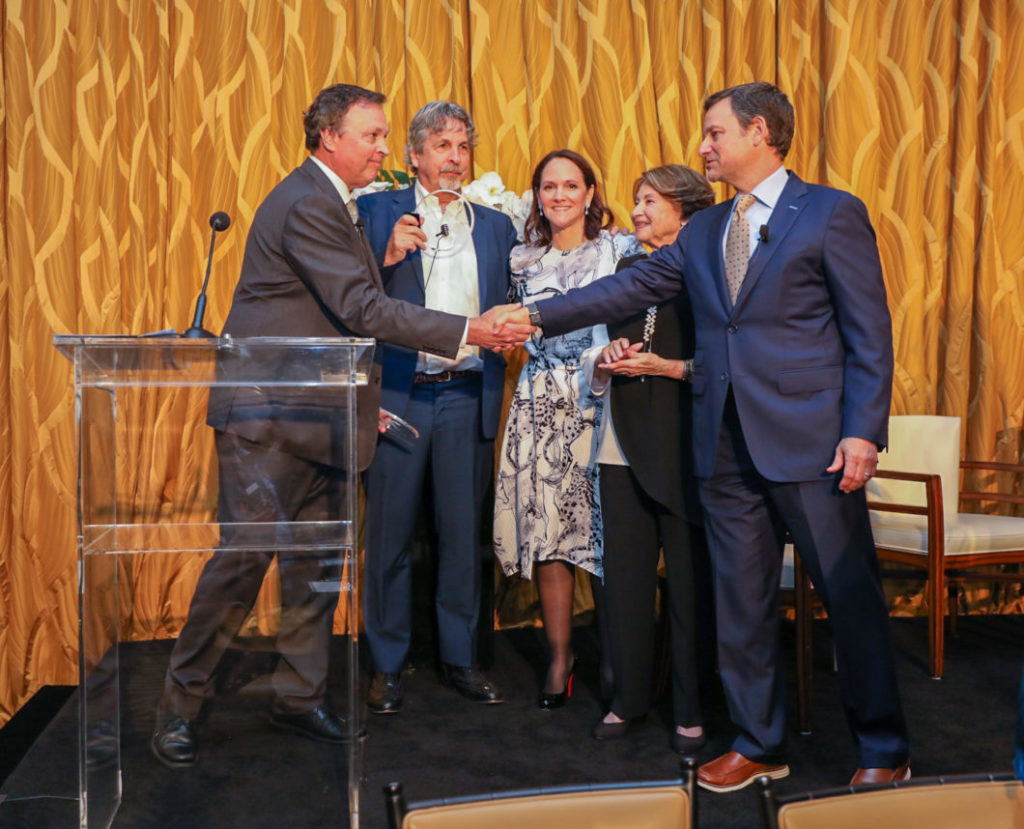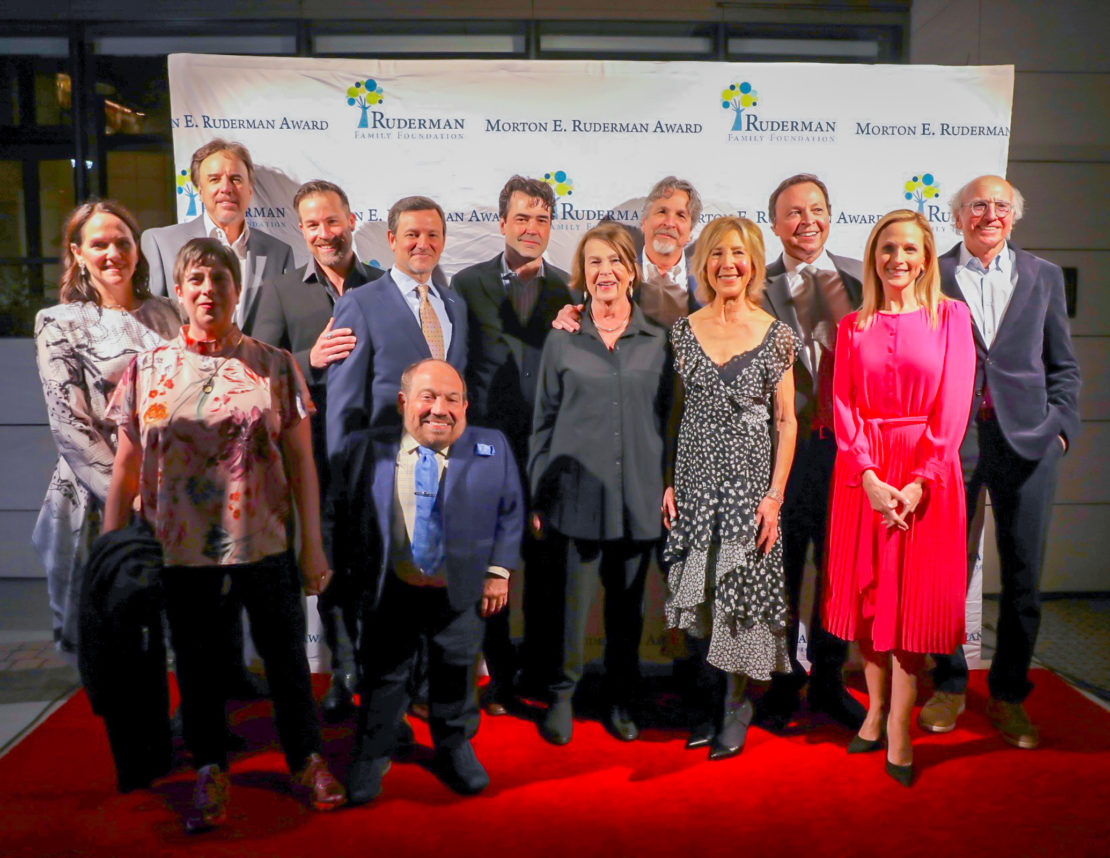BY ERIN BEN-MOCHE | MAR 11, 2020 | COMMUNITY
Jewish Journal
According to Ruderman Family Foundation President Jay Ruderman, 1 in 5 people has a disability but you wouldn’t know it if you watched a movie or TV show.
That’s why on March 3, the Foundation honored filmmakers Peter and Bobby Farrelly with the sixth Morton E. Ruderman Award in Inclusion at the Waldorf Astoria in Beverly Hills. The award honors the work the brothers’ have done to recognize people who have disabilities in Hollywood.
The Farrellys have been in the business a long time, having made the films “Dumb and Dumber,” (1994) “There’s Something About Mary,” (1998) “Shallow Hal,” (2001) “Stuck on You,” (2003) “The Ringer” (2005) and “Hall Pass” (2013). Peter co-wrote and directed 2018’s Academy Award-winning best picture, “Green Book.”
And while the brothers’ goal has been to entertain people around the world with their stories, they have also advocated for the disabled community by hiring disabled people in front of and behind the camera. Peter said that their decision to be more inclusive came after receiving criticism from one of their disabled friends after the release of “Dumb and Dumber.”
“We weren’t thinking about anything but making a movie and getting laughs and not getting fired,” Peter told the Journal during a round table discussion at the March 3 event. “After that came out, our friend Danny Murphy, who is a buddy of ours, said, ‘You know, I didn’t see a person with a real disability.’ And we were embarrassed. That’s an oversight. We will never do it again.”
Bobby noted that in “Dumb and Dumber,” there was a character in a wheelchair but he was played by an able-bodied actor.
“We haven’t done enough,” Peter said. “There are so many things that we hope to do in the future because the time has come right now. This is a population that has been overlooked.”
Currently, able-bodied actors on television play more than 95% of characters with disabilities. Since 2002, the Ruderman Family Foundation has fought systematic exclusion of the disabled community through Jewish values. They have made strides by holding professional sports leagues and Hollywood accountable.
The Foundation has created partnerships with the Sundance Film Festival, CBS and The Academy of Motion Picture Arts and Sciences. Ruderman Foundation’s 2019 White Paper report revealed more than 20% of top TV shows now include characters with disabilities compared with only 5% in 2016. This is because more industry leaders are advocating on behalf of people with disabilities.
Former first lady “Michele Obama said, ‘Most people will get to know people who aren’t like them through film and TV,’ ” Ruderman said. “It’s so rare that the disability community [sees] people like them and, if they are seeing people like them, they often aren’t authentically portrayed … [Peter and Bobby] can get people in the room that we couldn’t.”
The brothers are no strangers to people who have disabilities. “We were blessed to grow up in a neighborhood with lots of disabled kids,” Peter said. “We wanted the world to be real, so we started putting people with disabilities in [our films] because that’s the real world.”

Photo: From left to right: Bobby Farrelly, Peter Farrelly, Sharon Shapiro, Marcia Ruderman and Jay Ruderman during the award presentation. Credit: Joe Chung Photography.
On Dec. 23, 2005, a comedy about the Special Olympics titled “The Ringer” hit theaters. It took seven years to make because of pushback from the studios. The brothers, who were producers on the film, pushed to cast 150 people with disabilities in roles so their performances could be more authentic. They said they have been told by studios and producers to limit the number of disabled characters in their films because “it’s jarring” or “uncomfortable.”
Bobby said that when they were filming “Something About Mary” the studios shared concerns — not about the crude humor in the film — but how audiences would perceive people with disabilities on screen.
“They were concerned about the brother [Warren, who was based on a childhood friend] and thought maybe people were going to think we were poking fun or making them look bad,” Bobby said. “And we were like, ‘On the contrary.’ They wanted us to get rid of him. And we thought that would be wrong.”
“There’s a myth about hiring people with disabilities that they’re going to slow you down and they’re going to cost you money. We found the exact opposite. They are the most hardworking, prepared people on our set.” — Peter Farrelly
Academy Award-winning lead actress in 1986’s “Children of a Lesser God,” four-time Emmy nominee and deaf activist Marlee Matlin also attended the event. She received the Morton E. Ruderman Award in Inclusion in 2016, and told the Journal the Farrelly brothers’ ability to include people who have disabilities in comedic roles is important.
“A lot has changed, even in the years [since she received the Inclusion Award] where we are seeing more people aware of the importance of accessibility and inclusion for people like ourselves who are deaf, hard of hearing and disabled actors,” she said. “We still have a great deal of work to do but it’s not going to be impossible and I’m very excited to honor the Farrelly brothers because they get it. It helps that they do it with humor, which I think is extremely important in life.”
“There’s a myth about hiring people with disabilities that they’re going to slow you down and they’re going to cost you money,” Peter said. “We found the exact opposite. They are the most hardworking, prepared people on our set. … It [starts with] the casting people. You have to get [them] thinking that way — not just take them in roles with wheelchairs.”
The brothers said it’s hard to get your foot in the door if you are anyone in the entertainment industry but it is much harder if you have a disability because you can’t necessarily start at the bottom and work your way up as quickly as others.
Among those invited to celebrate the event and learn about how to be more inclusive were Larry David, Ted Danson, Cheryl Hines, Kevin Pollak, Danny Woodburn, Kevin Neelan, and New England Patriots wide receiver Julian Edelman.
Pollak, who was introduced to the Ruderman Foundation through the Farrellys, told the Journal that he “allegedly” is directing a film after wrapping Season 4 of “The Marvelous Mrs. Maisel” and this conversation couldn’t come at a better time.
“This is inspiring me to find roles for people with disabilities because it’s irresponsible not to once it’s been brought to your attention,” Pollak said.





